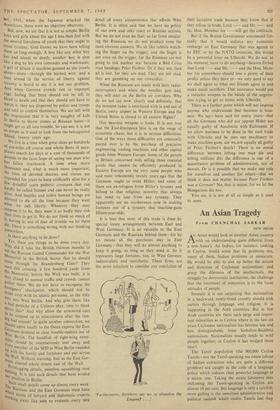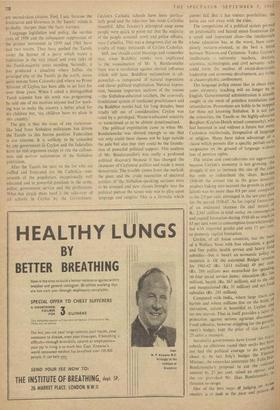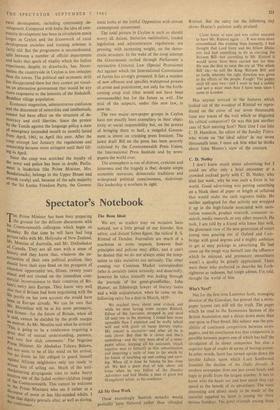An Asian Tragedy
From CHANCHAL SARKAR
NEW DELHI
AN Asian would look at another Asian country .A.with an understanding quite different from a non-Asian's. An Indian, for instance, looking at Ceylon, would sense that its problems are, many of them, Indian problems in miniature. He would be able to size up better the nature and direction of Ceylonese nationalism; and grasp the dilemma of the intellectuals, the struggle for democratic institutions, the challenge that the treatment of minorities is to the basic attitudes of people.
Innately it is not surprising that nationalism in a backward, newly-freed country should seek outlets through language and religion. It is happening in the Arab countries. But in few Arab countries are there such large and impor- tant minorities as in Ceylon where in the last six years Ceylonese nationalism has become less and less distinguishable from Sinhalese-Buddhist nationalism. Nationalism usually tends to weld people together; in Ceylon it has wedged them apart.
The Tamil population (the 900,000 Ceylon Tamils—not the Tamil-speaking tea estate labour of Indian extraction who are quite a different problem) are caught in the coils of a language policy which reduces their powerful language to a minor one. Taking the estate labourers into reckoning the Tamil-speaking in Ceylon are almost 18 per cent. But language is only a symbol; more galling is the unwritten administrative and political outlook which makes Tamils feel they are second-class citizens. Feel, I say, because the frustration and bitterness in the Tamils' minds is probably sharper than the facts warrant.
Language legislation and policy, the terrible riots of 1958 and the subsequent suppression of the protest movement in 1959 and 1961 have had two results. They have pushed the Tamils under the banner of a party which wants a federation in the tiny island and even talks of the Tamil-majority areas seceding. Secondly, it has produced a situation where Jaffna. the principal city of the Tamils in the north, seems quite remote from Colombo and where no Prime Minister of Ceylon has been able to set foot for over three years. When I asked a distinguished Tamil scientist how his work was progressing. he said one of the motives anyone had for work- ing was to make the country a better place for his children but, 'my children have no place in this country.'
The pity is that the want of any statesman- like lead from Sinhalese politicians has driven the Tamils to this barren position. Federalism is too extreme. It is unlikely to be conceded by any government in Ceylon and the federalists have no real argument except to cite the callous- ness and narrow nationalism of the Sinhalese politicians.
After the Tamils the next on the list who are ruffled and frustrated arc the Catholics— one- seventh of the population, exceptionally well educated and in powerful positions in the army, police, government service and the professions. What has struck them hard is the take-over of all schools in Ceylon by the Government.
Ceylon's Catholic schools have been particu- larly good and the take-over has made Catholics resentful. After January's attempted coup some people were quick to point out that the majority of the people arrested, army and police officers, were Catholics. This was a dangerous slur on the loyalty of many thousands of Ceylon Catholics.
Still, one should count blessings and remember that, when Buddhist monks were implicated in the assassination of Mr. S. Bandaranaike there was a revolution against clerical influence which still lasts. Buddhist nationalism is all- powerful—a compound of natural expression and clever political exploitation. Natural expres- sion, because important sections of the masses —the Sinhalese-educated teachers, the ayurvedic (traditional system of medicine) practitioners and the Buddhist monks had, for long decades, been totally left out. of consideration; Ceylon was ruled by a privileged, Western-educated minority so westernised as to be almost denationalised. • The political exploitation came in when Mr. Bandaranaike was shrewd enough to see that not only could these classes not be kept outside the pale but also that they could be the founda- tion of powerful political support, This analysis of Mr. Bandaranaike's was really a profound political discovery because it has changed the character of Ceylonese politics and made it more democratic. The trouble comes from the method. the pace, and the crude necessities of electoral politics. If the Sinhalese-speaking sections were to be aroused and new classes brought into the political picture the surest way was to play upon language and religion. This is a formula which cannot fail. But it has sinister possibilities; the horse can run away with the rider.
The compulsions of a political system pivoted on irrationality and hatred mean frustration for a small and important class—the intellectuals whose education has, at the worst, been com- pletely western-oriented, at the best a blend between Western and Ceylonese. Today Ceylon's intellectuals -- university teachers, doctors, scientists. technologists and civil servants- wh° could form :he nucleus of social-democratic leadership and economic development, arc living in claustrophobic confinement.
The language policy means that in about four years university teaching will no longer be in English. Governmental administration is already caught in the mesh of pointless translation and retranslation. Promotions are liable to be stopPed for those not knowing Sinhalese. It is not just the minorities, the Tamils or the highly-educated Burghers (Ceylon-Dutch mixed community). who feel hemmed in and without a future but many Ceylonese intellectuals, irrespective of language or religion. Many have taken advantage of a clause which permits (for a specific period) earlY resignation on the ground of language without loss of pension rights. The strains and contradictions arc aggiaoaled because Ceylon's economy is not growing: the struggle is not to increase the size of the cake but only to redistribute the slices. Between 1948-60 the annual rise in the gross domestic product (taking into account the growth in popu- lation) was no more than 0.9 per cent. compared to the 2.9 per cent. envisaged in the ten-year plan for the period 1958-67. As for capital formation, of an estimated increase (in real terms) of Rs. 2.943 million in total outlay on consumption and capital formation during 1948-60 as much aS 83 per cent went to consumption (overwhelminglY fed with imported goods) and only 17 per cent' to domestic capital formation. Ceylon, of all Asian countries, has the basis of a Welfare State with free education, a good and free public health service and heavy food subsidies--but it hasn't an economic policy to maintain it. Of the estimated Budget revenue for 1961-62 (Rs. 1,611 million) 49 per cent' (Rs. 789 million) was earmarked for spendil on four Social service items: education (Rs. 34,, million), health (Rs. 167 million), aid to the ow. and incapacitated (Rs. 31 million) and net food subsidies (Rs. 245 million). Compared with India, where large tracts are, barren and where millions live on the brink °I. starvation, nature is bountiful in Ceylon and no one starves. That in itself provides a layer of protection against serious agrarian discontent.• Food subsidies, however crippling for the governo merit's budget, kept the price of rice down to 25 cents a measure. Successive governments have found this Ilea' subsidy an albatross round their necks but hale
. not had the political courage to do anythinge
about it. In last July's budget the final" Minister, the somewhat autocratic Mr. Fens Di_dads Bandaranaike"s proposal to cut the rationc:
amount by 25 per cent. raised an uproar. n
'j to the stir provoked Mr. Dias Bandaranaike
threaten to resign. Asian
One of the best ways of judging an country is so look at the pace and Pattern (4 rural development, including community de- velopment. Compared with India the idea of com- munity development has been in circulation much longer in Ceylon and the framework of rural development societies and training schemes is fairly old. But the programme is uncoordinated, split between a number of official departments and lacks that spark of vitality which the Indian experiment, despite its drawbacks, has. Never- theless the countryside in Ceylon is less unhappy than the towns. The political aad economic drift has disappointed them but they cannot yet visual- ise an alternative government that would be any More responsive to the interests of the Sinhalest- Buddhist village population. Economic stagnation, administrative confusion and the discontent of minorities and intellectuals, cannot but have effect on the structure of de- mocracy and civil liberties. Since the protest by the Tamils against the language policy a state of emergency (extended month to month) lasted from April, 1961, to April this year. After the e°1113 attempt last January the regulations and censorship became more stringent until their lift- ing in April.
Since the coup was scotched the loyalty of the army and police has been in doubt. Parlia- ment is leaderless (the Prime Minister, Mrs. handaranaike, belongs to the Upper House and attends rarely) and, because of the safe majority of the Sri Lanka Freedom Party, the Govern-
ment looks at the fretful Opposition with almost contemptous amusement.
The total picture in Ceylon is such as should worry all Asians. Sectarian nationalism, loaded legislation and administrative regulations are pressing, with increasing weight, on the demo- cratic structure. In the wake of the coup attempt the Government rushed through Parliament a retroactive Criminal Law (Special Provisions) Act against which the International Commission of Jurists has strongly protested. It lists a number of new offences and specifies widespread powers of arrest and punishment, not only for the forth- coming coup trial (that would not have been unreasonable) but for the future as well. The trial of the suspects, under this new law, is now on.
The two major newspaper groups in Ceylon have not exactly been exemplary in their objec- tivity or social responsibility but, on the pretext of bringing them to heel, a vengeful Govern- ment is intent on crushing press freedom. The latest draft Bill on the press has been severely criticised by the Commonwealth Press Union, the International Press Institute and by news- papers the world over.
The atmosphere is one of distrust, cynicism and bitterness and the tragedy is that, despite ample economic resources, democratic traditions and widespread political consciousness, statesman- like leadership is nowhere in sight.




































 Previous page
Previous page